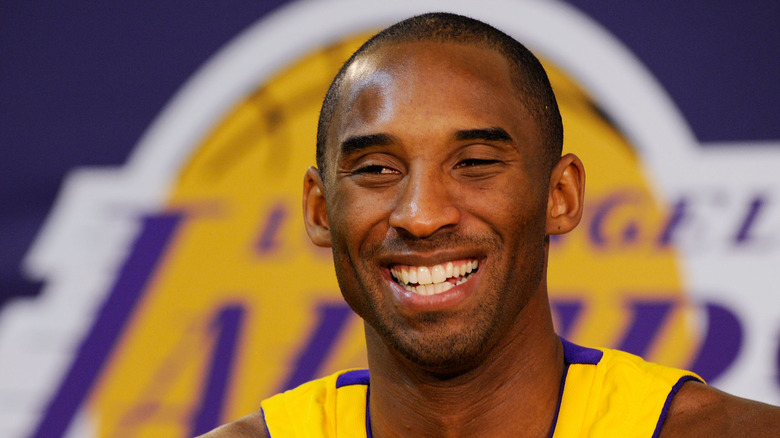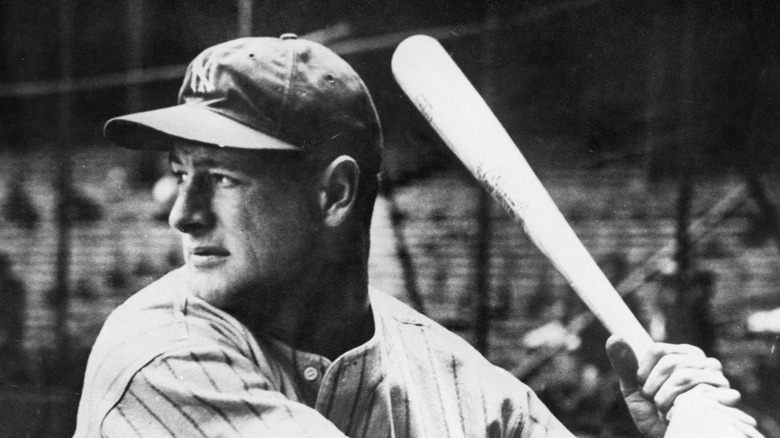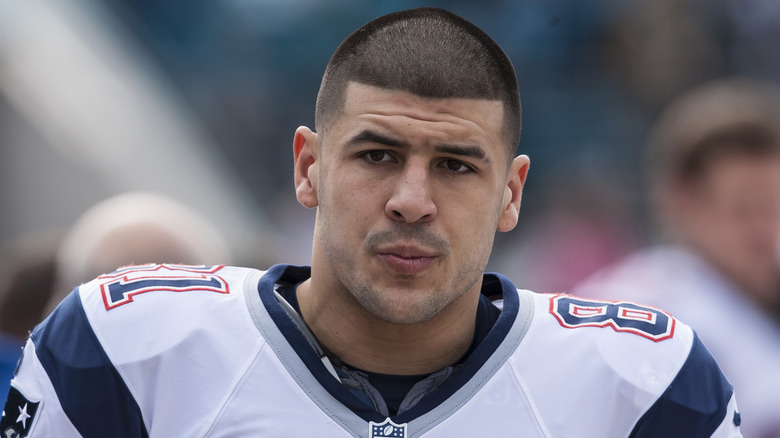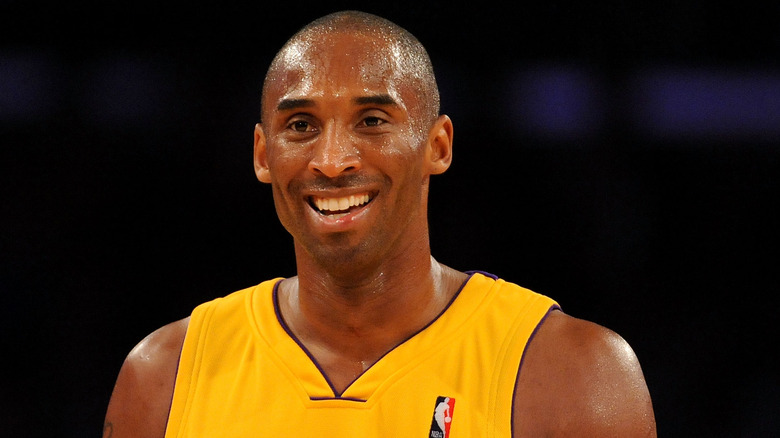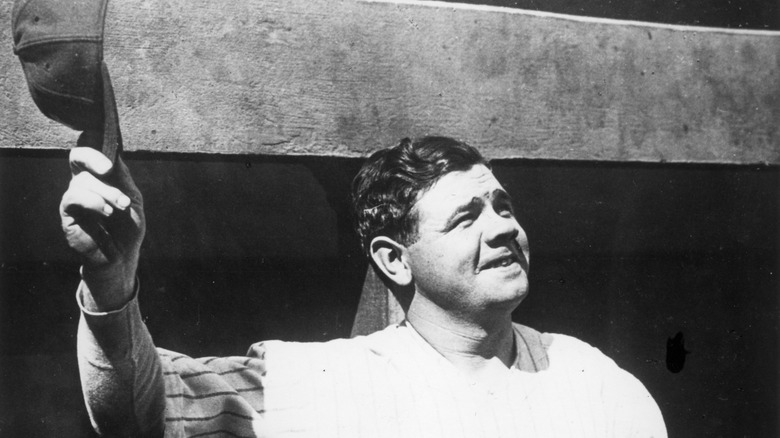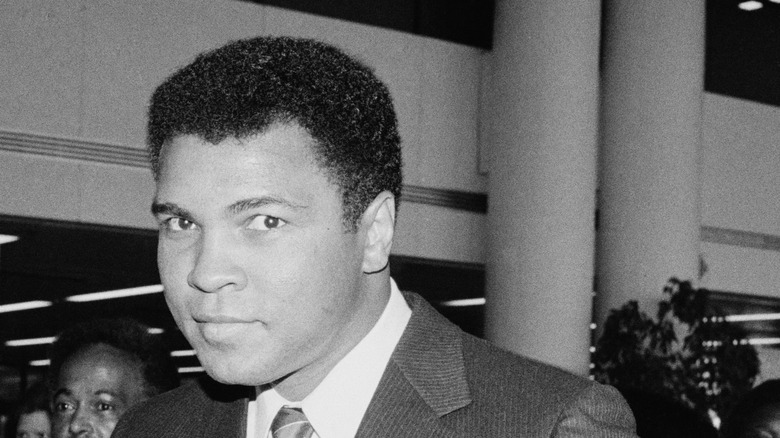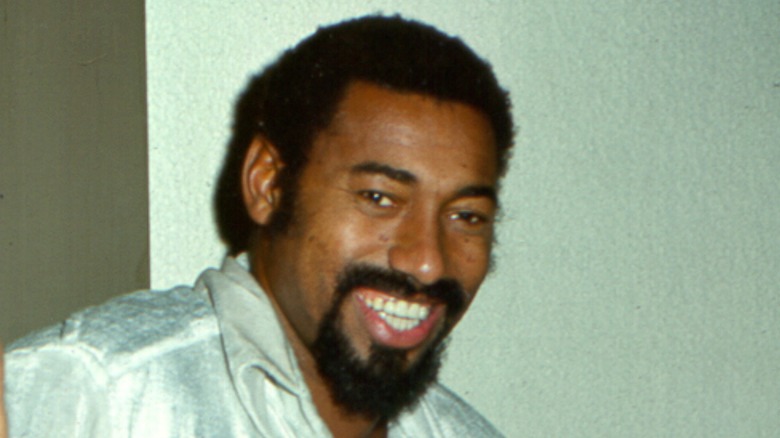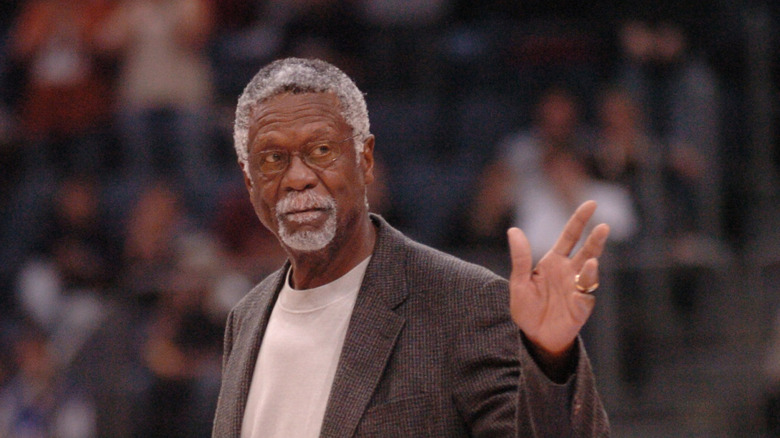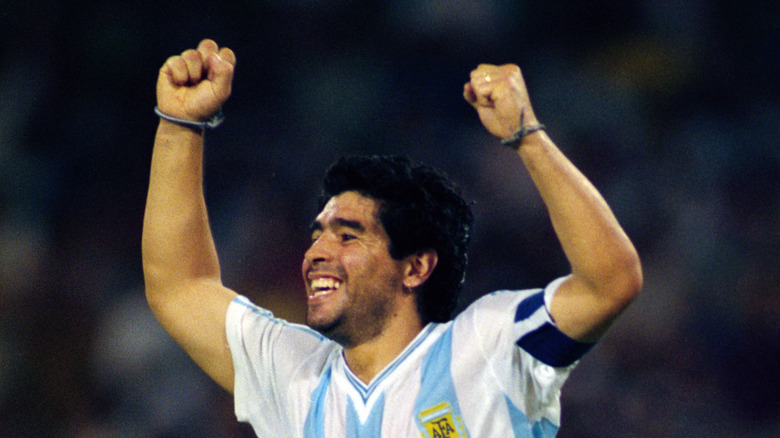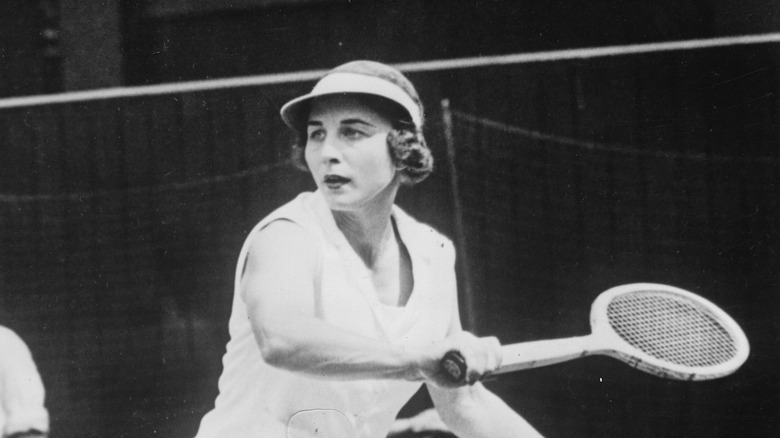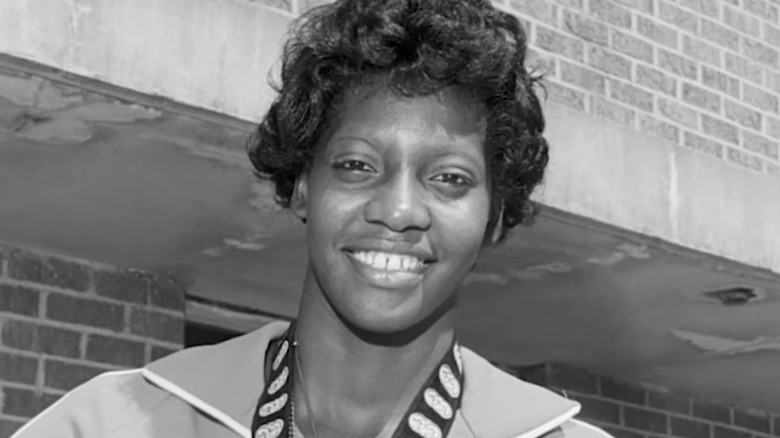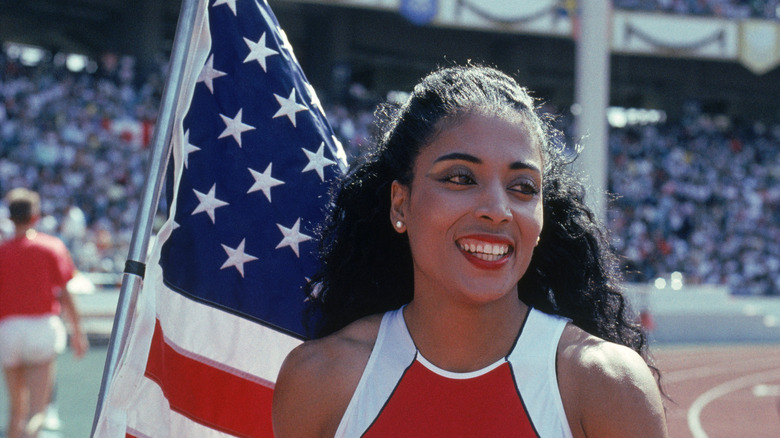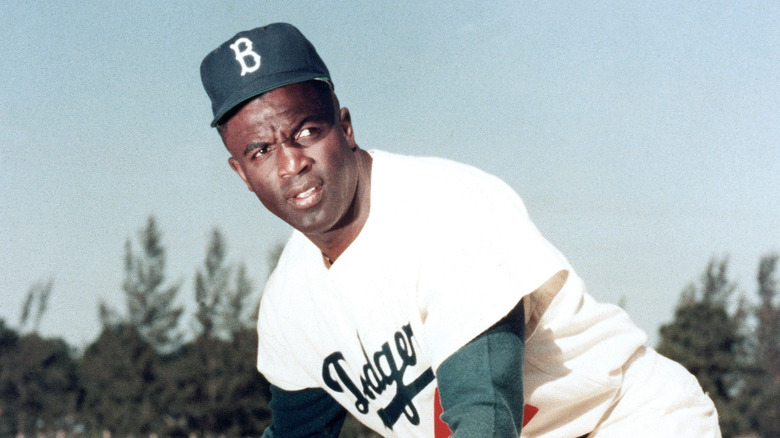Final Interviews Of Famous Athletes
Though sports icons are primarily known for their achievements on the field (or pitch or court), their insights into their thoughts and experiences are often just as valuable as their trophies and medals. In fact, some quotes from athletes are some of the most famous of all time. For example, Wayne Gretzky's "you miss 100% of the shots you don't take" or Vince Lombardo's "it's not whether you get knocked down, it's whether you get up" are ubiquitous on blogs on motivation and success (per Life Hack).
But, despite providing kernels of wisdom, the life of an athlete after the sporting years can be a difficult one. Some athletes are able to look back on their careers with fondness and wisdom. Others have to deal with the physical scars from their demanding careers. Lastly, some can confess to feeling sadness or even anger about their careers due to its demanding nature, fans, and media intrusion. Here are what are believed to be the last interviews with some of the world's best athletes who died too soon.
Lou Gehrig
Baseball great Lou Gehrig was once known as the Yankees' "Iron Horse" for his unfailing dependability. However, his name quickly became associated with the disease Amyotrophic Lateral Sclerosis after he was diagnosed with ALS at just 36 years old. In the last week of his baseball career, Gehrig gave an interview to The Seattle Star in which he brushed off criticism that his tireless work ethic had spurred the progression of his disease.
"I know what you're thinking. That if I had nursed myself along I wouldn't be worrying so much today. My legs would be faster, my eyes sharper, everything would be better. But you're wrong. Wrong about me, anyhow. I never could help giving all I had . . . I'll never forget [Colonel Ruppert, owner of the Yankees] telling me that no man who ever worked for him had leveled any more than I had."
Gehrig also expressed his hopes about continuing to play and thanked his loyal fans for helping him through the difficult time. Though Gehrig's comments to The Seattle Star were his last official interview, he later delivered an iconic speech on July 4, 1939, during an event called Lou Gehrig day. His speech remains a masterclass in hope and gratitude: "Fans, for the past two weeks you have been reading about the bad break I got. Yet today I consider myself the luckiest man on the face of this earth," he declared to a packed Yankee Stadium (via Sports Illustrated).
Aaron Hernandez
Sometimes, the most mundane of interviews can actually hold deep clues when analyzed in hindsight. This seems to be the case with Aaron Hernandez, a star tight end for the New England Patriots whose career ended after he was arrested for the murder of his friend Odin Lloyd in 2013. He was found guilty and sentenced to life in prison in 2015. During that time, he was also indicted for two other murders; though he was acquitted of the charges, he died by suicide just days after the verdict. An autopsy later showed that he suffered from extreme chronic traumatic encephalopathy (per The Washington Post).
In what appears to be Hernandez's final interview, reporter Les Carpenter asked the athlete (via The Guardian) about the Patriot's newest recruit, University of Florida superstar Tim Tebow. Hernandez was "polite," muttering that Tebow was a "great team-mate, great leader." He also answered a question about the public fascination with Tebow with similar cordial brevity.
However, Carpenter later noted that Hernandez seemed off. "His responses were short, and strangely devoid of insight ... His voice lacked warmth. He struck me that day as a man detached from the team on the field beside him," Carpenter wrote in The Guardian. Carpenter was not wrong to sense that something was wrong with the then 23-year-old. Just days later, he murdered Lloyd — spurring the end of his career, his imprisonment and death, and grief for Lloyd's family and friends.
If you or anyone you know is having suicidal thoughts, please call the National Suicide Prevention Lifeline by dialing 988 or by calling 1-800-273-TALK (8255).
Kobe Bryant
The year 2020 started with sad news when Kobe Bryant, his daughter Gianna, and seven other passengers died in a helicopter crash near Calabasas, California, per The New York Times. Bryant was just 41 years old at the time of his death. The basketball legend retired in 2016 after an illustrious career at the Los Angeles Lakers, two Olympic gold medals, and an All-Star title for all but two of his career seasons.
Bryant gave a sit-down interview to USA Today just 10 days before his tragic death. In the interview, he discussed how he was at peace with his NBA career and shared his excitement at creating a "second act" that would be as great as his basketball one. Though his plans sadly never had a chance to come to fruition, Bryant's excitement about his future — including entering the children's entertainment realm — is palpable.
"Our challenge now is taking books and making them into films, feature films and in series, some of which will be animated and some of which will be live action," he said of his upcoming endeavors. "You got to do what you love to do. I love telling stories. I love inspiring kids or providing them with tools that are going to help them."
Babe Ruth
Baseball legend Babe Ruth is not only famous for his skill on the diamond but also for his clever commentary, and he remains one of the most quoted sports stars in history. Some of his most famous sayings include "never let the fear of striking out keep you from coming up to bat" and "it's hard to beat a person who never gives up" (via Baseball Bible).
But while the above quotes showcase Ruth's gumption and perseverance, his final interview from early August 1948 shows his compassion. According to biographer Jane Leavy in The Art of Manliness, Ruth's final interview in the last months of his life was with an 11-year-old blind boy from Minneapolis named Johnny Ross. At the time, Ruth was in particularly poor health, and his cancer had spread to his nasal passages, making it difficult to speak. Nevertheless, the Great Bambino kindly answered Johnny's questions about who would win the pennant, how he was feeling, and his thoughts on the best pitchers in the league.
When Johnny didn't know how to conclude the interview, Ruth did. He put his arm around the young boy and said, "It's all right. We're both just about out of words." He died just days later, on August 16.
Muhammad Ali
Boxing icon Muhammad Ali never shied away from sharing his thoughts and famously boasted about his achievements, his skill, and even his looks. But his confidence was well-warranted: He is arguably considered the best boxer of all time, winning a full 56 of 61 fights as well as an Olympic gold medal. However, in 1981, "The Greatest," as he called himself, decided to retire and shortly after was diagnosed with Parkinson's disease (per CBS Sports).
However, Ali remained involved in sports and was a member of a roundtable discussion with other famous athletes during the 2004 Summer Olympics held in Athens. According to interviewer Jim Gray of Sports Illustrated, the appearance was his final televised interview. Gray noted that even though the roundtable was filled with a number of other great icons, such as Sugar Ray Leonard, Carl Lewis, Mary Lou Retton, and Michael Phelps, they still seemed in "awe" of Ali. According to the Los Angeles Times, Ali showed some of his trademark joking competitiveness by telling Leonard he better "apologize" if he even "dreams" of another fight.
Moreover, though Ali was known for his self-focused bravado, some of his last words in the interview were actually to give encouragement to another athlete — none other than Michael Phelps. "I'm the Greatest. You're the latest. It's up to you now," he said. Ali then handed Phelps the Olympic torch, and added, "Go win all those medals."
Wilt Chamberlain
Basketball Goliath Wilt Chamberlain is an icon of the sport's golden era. Standing at 7 feet and 4 inches tall, Chamberlain was considered one of the greatest NBA players of all time and still holds numerous basketball records. Arguably his crowning achievement was scoring 100 points in a single game against the New York Knicks, which remains the all-time best in the league (via The New York Times).
In what appears to be his final interview, Chamberlain sat down with a television crew from Philadelphia to discuss his regrets, his desire to fight Muhammad Ali, and his life in general. As summarized by ESPN, Chamberlain referenced his infamous rivalry with Boston Celtics player Bill Russell. Chamberlain claimed that "if you could give me 10 points in all those seventh games against the Boston Celtics, instead of Bill Russell having 11 rings, I could've at least had nine or eight."
Russell also brought up Chamberlain's desire to box Muhammad Ali in his prime and was even offered $5 million for the fight. However, his dad wisely told the Big Dipper to "work on his free throws instead." Lastly, Chamberlain also brought up his much-discussed confession that he had slept with around 20,000 women throughout his life. Chamberlain claimed that the comments were misinterpreted, and said that while his nocturnal escapades were an important part of his life, "I've found out that having one woman a thousand different times is much more satisfying."
Bill Russell
Bill Russell was a giant in basketball, with many considering him to be the greatest player of all time. Russell won 11 NBA championships and was named an NBA all-star 12 times — a particularly impressive feat considering his career spanned just 13 years (via The New York Times).
But despite a career that brought him fame and fortune, Russell sadly confessed that he never felt comfortable playing for the Boston Celtics, the team he helped catapult to greatness, because of the racism he faced from The Boston Herald. In what is believed to be his final interview, he spoke with CBS Mornings about the difficulties he faced as a black athlete, and later the country's first black coach, in a less progressive time.
In one heartbreaking confession, he said that "no matter what" he did in his early years, star teammate Bill Couzy would win a majority of the praise and adoration from the press because he was white. These experiences likely shaped Russell's interests off the court. He was a staunch supporter of civil rights throughout his life and even marched with Martin Luther King Jr. during the 1960s. Russell and other black teammates even boycotted a game down in Kentucky when they were refused service at a Lexington bar. In the interview, Russell confessed that after the boycott, baseball legend Jackie Robinson, who himself broke the color barrier, mailed him a letter of support and thanks for his actions.
Diego Maradona
Diego Maradona is considered one of the best soccer players ever to grace the pitch and even won FIFA's "World Cup Goal of the Century" for a shot from the 1986 World Cup. He was also famed for his "hand of God," after he punched a ball to the goal to score against England in 1986, per CNN.
The Argentina native was no stranger to machismo, and often boasted of his own achievements and skills. In that vein, it's little surprise that the soccer legend made sure to have the last word, by publishing an autobiography titled "Diego Maradona: The Last Interview." In excerpts published by Inside Hook, El Pelusa discussed his love of soccer and more. "I was and am very happy. Soccer gave me all I have, and more than I could have imagined," he confessed.
Maradona also touched on current events, particularly the coronavirus pandemic. At the time of Maradona's death, the virus was still spreading quickly and claiming thousands of lives throughout Argentina and South America in general, and Maradona movingly spoke of the destruction and poverty that accompanied the disease.
"It pains me to see kids with nothing to eat; I know what it is like to go hungry; I know what it feels like in your stomach when you haven't eaten for several days," he added, giving insight into his own less fortunate past. Maradona died in 2020 due to heart failure, per NPR.
Helen Wills
Helen Wills was the first female American international sports star. Born in 1905, she quickly shot to tennis greatness as a teenager and was the top-seeded player for eight years. According to The New York Encyclopedia, she won 31 Grand Slam titles in total, including 18 singles titles. Most amazingly, she had a 180-match winning streak starting in 1927, all without forking up a single set, per The Bleacher Report. However, though Wills was talented and famous, she did not like the attention. Famously serene on the court, she was even dubbed "Little Miss Poker Face" by her critics for her lack of emotion.
Wills continued on her winning streak through 1938, until international unrest and the start of World War II made sporting events impossible. However, it was in Wills's final interview where she confessed that the real reason for her retirement wasn't her reluctance to return after the war, but rather a serious hand injury she underwent after she tried to break up a dogfight between her German Shepard and another animal.
"I got bitten in the hand and had my finger bitten off and that ended my tennis," she said in a 1994 interview with Inside Tennis. She died four years later, at 92 years old (via The Washington Post).
Lusia Harris
Lusia Harris might be the best athlete few people have heard of. As noted by NPR, she helped her college team win NCAA championships in the 1970s, scored the first points in the history of Olympic women's basketball, and was even drafted by the New Orleans Jazz, the only woman ever to be drafted by an NBA team.
But unfortunately, the era that Harris lived in was not built for female athletes, especially ones of color. The WNBA did not yet exist, and though Harris was able to play for one year in the Women's Professional Basketball League (WBL), it folded after 12 months.
To honor Harris's accomplishments, basketball legend Shaquille O'Neal helped spearhead a short documentary on her titled "The Queen of Basketball," in which Harris discusses everything from her personal life to her struggles with mental health. Most touchingly, she talks about how her life would have been different had she been born a man: "There would have been options for me to go further and play ... I would have had money, would have been able to do a lot of things that I would have wanted to do," she mused.
However, she remained grateful for her experience, despite the inequality. "I wanted to grow up and shoot that ball just like they would shoot it, and I did." She died just four days after the interview on January 18, 2022.
Florence Griffith Joyner
Florence Griffith Joyner, often known as "FloJo," instantly became a superstar after her incredible performance in the 1988 Olympics. In the trials for the event, she set a world record in the 100-meter sprint and went on to win three gold medals. After her retirement, she dedicated her time to helping underprivileged children, per Britannica.
Joyner died in 1998, 10 years after her year of glory, after suffering from an epileptic seizure in her sleep (via the Los Angeles Times). In an eerie twist of events, Joyner actually filmed an episode of "Hollywood Squares" just a few weeks before her death. Unfortunately, the station was not able to scrap the episode on the day of her death, so fans saw one last video of her just hours after news of her passing broke (per The Washington Post). In the episode, she was asked about the major difference in "equipment" between men's and women's basketball. She cheekily answered, "the balls."
Jackie Robinson
Baseball legend Jackie Robinson was born in 1919 in Cairo, Georgia. After serving in the army, he became a baseball star in the Negro League. In 1947, he started playing with the Brooklyn Dodgers, becoming the first Black athlete to play in the MLB (via History).
Though some of his last interviews are fluff, Robinson's final interview could not have been more meaningful. Conducted on October 18, 1972, Robinson talked with Larry Upton, a fellow former baseball player in the Brooklyn Dodger Organization and a Boston radio sportscaster, about his life and achievements, particularly with breaking the color barrier.
"I'm proud of that day," Robinson confessed, in audio saved on the official Jackie Robinson website. "I look back on it as the day that saved baseball," he added. Upton also touched on Robinson's activism for Civil Rights and bettering race relations, to which Robinson replied, "You have to do everything you possibly can."
Robinson died less than a week later on October 24, 1972, due to complications from heart problems and diabetes. His number, 42, has been retired by all MLB teams, and April 15 has been deemed Jackie Robinson Day in remembrance of his bravery.
